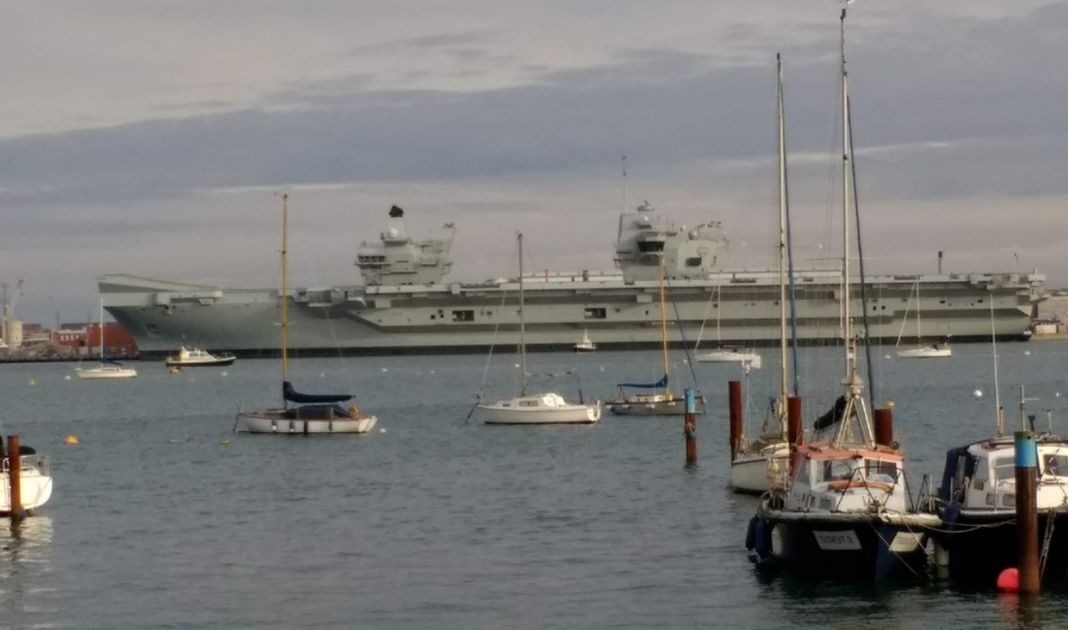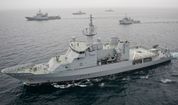British-Ukrainian military cooperation as a part of London’s Post-Brexit Strategy. Part 2

HMS Prince of Wales (Source: geograph.org.uk)
Zelensky’s visit to London to gain the status of the UK’s Strategic Partner
However, what were truly revolutionary and historic were the documents signed recently between London and Kiev. The Political, Free Trade and Strategic Partnership Agreement signed on 8th October 2020 in London during the official visit of the Ukrainian President to the UK. This demonstrates that Great Britain is committed to continuing its post-Brexit strategy, and alternatively that London has pledged to continue its traditional geostrategy towards the Black Sea and Eastern Europe. The document includes economic, political and security chapters. Furthermore, it outlines that the level of the relationship has evolved into a new stage of “strategic political dialogue and cooperation”. Some special attention has been paid to the fields of foreign and security policy. For example, Article 9 shows that there is military cooperation in the broader sense: “in areas of mutual interest, including but not limited to information on the development and implementation of national military doctrines, advice on defense policy and management, participation in joint exercises, military intelligence, the training of service personnel, legal matters of military service, cooperation in areas of military healthcare, identifying opportunities to purchase military equipment, spare parts and supplies, as well as improvement of defense and military capabilities.” This made it evident that a comprehensive level of cooperation has been established between the countries.
The UK’s Naval Commitments to Ukraine
Another important defense document was signed on 8th October 2020 in Portsmouth and aboard British HMS (aircraft carrier) “Prince of Wales”. The two countries signed a Memorandum of intent on cooperation in developing and enhancing the capabilities of the Navy of the Ukrainian Armed Forces. This covers the issues of samples of modern military equipment and the newest high-precision armaments as well as the construction of naval bases. It is also intended to scientifically strengthen the capabilities and combat potential of the Ukrainian Navy and the level of interoperability with the naval component of NATO member states.
Additionally, a Memorandum on enhancing cooperation in the military and military-technical spheres was signed. The most significant element of this document is the financial commitment of London to Ukraine – a £1.25 billion budget for the realization of different projects in the defense sector. Using this loan, Ukraine plans to build 8 gunboats for the Ukrainian fleet (rocket boats, 50 m. long with tonnage 400 ton.). Two of them are planned to be built in the UK’s dockyards and the rest in Ukraine. These ships will be able to carry strike weapons in the form of eight anti-ship missiles, both foreign-made and Ukrainian “Neptune” missiles.
The Ukrainian Minister of Defense added that the document refers to the future supplies of modern models of military equipment and the latest high-precision weapons, the establishment of certain types of military products in Ukraine, as well as the construction of Ukrainian naval facilities. The decision to build 6 of the gunboats in Ukraine is a result of the pressure of the Ukrainian industry lobby. Ukraine has several indigenous projects and the decision to cooperate with London has not made many Ukrainian R&D units happy because this may come as the last blow to the Ukrainian (the Soviet heritage) shipbuilding industries.
The UK is one of the most committed nations, constantly calling for freedom of navigation in the Black Sea. Since 2014, American and British warships have been visiting the Black Sea and Ukrainian ports, both as a projection of power and because the Ukrainian Navy does not have the naval capabilities for naval reconnaissance and naval power in order to successfully deter Russia in the western zone of the Black Sea. Interestingly, it was only in 2019 that the British Navy took part for the first time in US-supported naval exercises “Sea Breeze.”
After Zelensky’s visit, it seems certain that Great Britain will provide Ukraine with the new warships, with weapons and the restoration of port facilities. But the most intriguing part of all of this is the decision by Ukraine to build new naval bases in the Sea of Azov and in the Black Sea with the assistance and funding from the UK. In his speech in the Ukrainian Parliament, Zelensky once again repeated that Ukraine was ready to build new naval bases. In Moscow, such an initiative found a negative reaction, where it was commented that this would undermine regional stability. Moreover, the two countries are deepening their interagency cooperation in the field of countering cyber threats. The question is still open over whether or not the British and American projects are going to be merged into one or will appear in a collaborative platform. For example, the US is already funding and assisting the EXBS Program in the building of the naval bases in the Sea of Azov (Berdyansk and Mariupol). Ukraine recently adopted the decision to relocate several bases from Odessa and Nikolaev to the shores of the Azov Sea.
As it is possible to see, Ukraine is making serious steps in the direction of its closer cooperation with NATO member countries. However at the same time, three other countries demonstrate unique readiness to cooperate with Ukraine as an independent player. London is searching for its own place in the changing global correlation of forces after it is already certain that Brexit is inevitable. The UK is returning to its traditional grand strategy in Eurasia, blocking and isolating Russia from Eastern Europe and the Middle East. The role of Ukraine is most crucial because Ukraine is the gateway to the Eastern Europe and is a part of the Greater Middle East. It is too early to speak about a permanent presence of the US or British troops on the territory of Ukraine, but the direction is certain. Especially, if we take into consideration the fact that the Ukrainian government has made several amendments to Ukrainian law within the last six years, meaning that foreign troops can be invited to Ukraine, not only for exercises.
Autor
Ridvan Bari Urcosta
Senior Analyst at Strategy&Future






Trwa ładowanie...